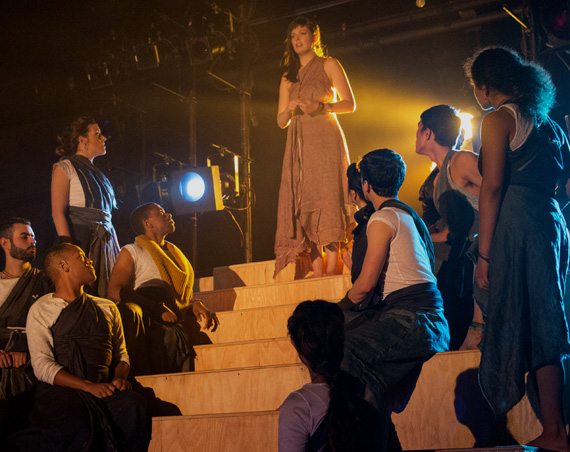Tamar of the River
Marisa Michelson and Joshua H. Cohen’s ambitious world premiere musical about an endless war between East and West bites off more than it can chew.

(© Richard Termine)
You have to admire the muscular and unapologetic theatricality of Tamar of the River, Marisa Michelson and Joshua H. Cohen’s new musical, now making its world premiere at the Baruch Performing Arts Center in a production by Prospect Theater Company. In an age when the stage increasingly seeks to emulate the screen in both form and content, to see a director take advantage of live performance with uniquely theatrical tools is a breath of fresh air. It is just unfortunate that this particular live experience is in service to an inane and reductive script.
Inspired by the biblical story of Tamar, Tamar of the River takes place in a mythical desert land divided by a river. The people of the east bank and the people of the west bank are engaged in an endless struggle for dominance over the river, which is not only the source of life in their arid land, but endowed with magical voices that both sides take very seriously. (Everything is very serious in this mostly humorless play.) When Tamar (Margo Seibert) receives a cryptic prophecy from the voices, she thinks she sees a roadmap for peace. That’s when she meets the strapping and handsome Onan (Mike Longo), son of the western military leader Judah (Erik Lochtefeld). Hurricane Tamar blows her way through this unsuspecting western family, bedding all but one of the men while trying to establish a peace village on the river that will bring together the people of the east and west in mutual cooperation. She’s on her feet all day, on her back all night: such is Tamar’s dedication to peace. Unfortunately, lots of people die anyway.
Tamar’s peace village seems inspired partially by Neve Shalom, a cooperative village founded jointly by Israeli Jews and Palestinian-Israeli Arabs that composer Michelson visited a few months after being commissioned to write this musical. While tribalism and its role in driving global conflicts throughout history is certainly an ambitious and admirable subject for a musical, the book falls woefully short of addressing the surrounding issues in a substantive and conversation-changing way. It all feels like stuff we’ve heard before.
By contrast, Michelson’s challenging and tonally complex music is some of the most unique and beautiful I’ve heard in musical theater. The high-flying trills, warm harmonies, and legato articulation of singular words (“God” sung in about 20 descending notes, like a wail) really help establish the emotional landscape of this alien world struggling with the same issues we face in our own. When she writes music for the river (performed by every actor spare Seibert), one imagines that this is what the prophets heard when receiving the word of God.
The stellar cast effortlessly delivers this very difficult material while performing Chase Brock’s visually appealing choreography, which turns human bodies into a rushing river. Seibert (who is set to make her Broadway debut as “Adrian” in Rocky) is vocally powerful but visually inscrutable as the well-meaning but constantly faltering Tamar. With such an excellent cast, director Daniel Goldstein has created some arresting moments on stage.
Appropriate for a story about conflict, the audience is seated on two sides of a traverse stage that mirrors the river separating the east and the west. Set designer Brett J. Banakis has wisely kept this runway uncluttered, allowing Goldstein to fit the huge scope of this play into the space by using every corner of the theater, including the catwalks behind the audience. While unraveling scrolls and multitudes of little lanterns on a hillside make for spine-tingling stage pictures, the fact that it is all in service of such a deeply reductive script is disappointing. In the end, all we are left with is a bunch of very attractive actors adorned in rags, ceremonially dancing and singing on a hanamichi.
These strange desert folk certainly look and sound alike, and they are all beholden to their psychotic imaginary friends in the river. With so much in common, why can’t they all just be friends? Tamar of the River punts on this question, untidily wrapping up an issue that was perhaps too big for a 100-minute musical by having the chorus sing, “It is their children’s children’s children who will bring a lasting peace.” Bleak.









